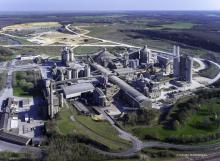The two lines with an overall capacity of 20,000tonnes/day of cement will be built at a new site around 80km east of the capital Riyadh. The value of the contract is said to be in the “higher three-digit million-euro” range. It is the largest cement contract ever secured by Thyssenkrupp.
Yamama Saudi Cement and Thyssenkrupp have been working together since the 1960s when the company placed an order for an initial 300tonnes/day rotary kiln. Six more, ever bigger cement production lines were added in following years.
ThyssenKrupp Industrial Solutions will provide engineering, procurement and construction for the lump sum turnkey cement plant, including the supply of all the components for the new lines, from raw material preparation to clinker manufacture to cement loading, and quality control. Both lines are scheduled to start operation in 2018.
The main components include two mobile primary crushers for limestone (each 1,800tonnes/hour throughput), three crushers for additives (each 500tonnes/hour), two crushers for correctives (each 100tonnes/hour) as well as two circular blending beds for limestone, each with a capacity of 80,000tonnes and various additive storage facilities. Four Quadropol QMR2 roller mills with a throughput of 425tonnes/hour and two 35,000tonne capacity homogenising silos will be used to grind and store the raw material.
The kiln lines comprise six-stage and two-string preheaters with Prepol AS-MSC calciner, rotary kilns with Polyflame-VN clinkering zone burners, and Polytrack clinker coolers. The clinker will be stored in three 10,000tonne capacity clinker silos and two 100,000tonne capacity clinker storage facilities. Four combi grinding units consisting of Polycom high-pressure grinding rolls, ball mills and Sepol separators as well as downstream cement coolers will each produce 300tonnes/hour of cement.
The cement will be stored in six cement silos each with a capacity of up to 25,000tonnes. The line will also feature six cement packing and loading stations. Quality control and monitoring will be handled by a Polcid process control system and Polab laboratory automation system.






